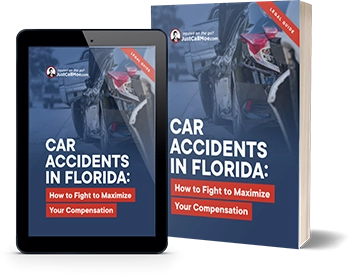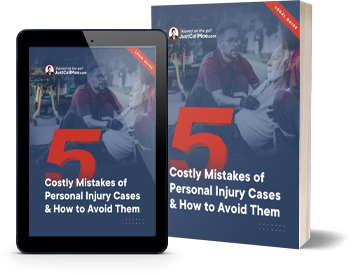Weather is one of the major reasons people move to Florida. It can also be one of the reasons people come to hate driving in Florida. The Sunshine State has an infamous tropical climate that can go from sunny to stormy in a matter of seconds. And while most Central Florida residents can avoid the harsher winter snow seen up north, even the area’s extreme heat and humidity can create certain hazards when it comes to driving.
All of this is to say that weather-related car accidents are more common than you might realize. While there is nothing any of us can do to control the weather, car accidents are often the result of negligent acts on the part of others who fail to properly plan or account for changes in weather conditions. Here are a few things you should therefore keep in mind when it comes to weather-related accidents in Florida.
How Weather Can Make Car Accidents More Likely?
If you have lived in Florida for any length of time, then you already have a good idea of the types of weather conditions that make driving more difficult. Let’s run down a few of the more common examples:
- Heavy Rains: During the summer months, Central Florida experiences frequent bouts of heavy rains and thunderstorms. Even a quick afternoon thunderstorm in Orlando can severely reduce visibility, produce slick roads, and lead to potential hydroplaning by vehicles.
- Tropical Storms/Hurricanes: According to the National Center for Disaster Preparedness, 8 of the 10 counties in the United States with the highest reported hurricane damage each year are located in Florida. Aside from the dangers posed to road traffic during a hurricane or tropical storm event, the resulting damage to roads and other local infrastructure can make travel hazardous for days–even weeks–after the storm has passed.
- Humidity: Florida’s high summer heat and humidity don’t just make you sweat. Your car is also affected by such conditions. Humidity can fog up windows, reducing a driver’s visibility, and lead to mechanical issues as well.
- Fog: We often see dense, foggy conditions during the early morning and late evening hours here in Central Florida. Such fog creates an obvious traffic hazard by reducing visibility and making it more difficult for motorists to see other drivers or obstacles in their immediate path of travel.
Negligence and Weather-Related Accidents in Florida
Obviously, changes in the weather are “acts of God” and not the fault of any person. That does not mean, however, that poor weather conditions absolve a negligent driver or other third party in the event of a car accident. As a matter of law, a driver has a duty of care to everyone else on the road to operate their vehicle in a reasonably safe manner. This duty includes driving appropriately during hazardous weather.
Here are a few examples of how car accidents due to weather conditions can still be legally attributed to individual negligence:
- Not Slowing Down: When there is poor visibility, such as due to a thunderstorm or fog, all drivers need to slow down and proceed with caution. Even if a driver is going the posted speed limit, that may still be unreasonably dangerous based on the current weather conditions. And it should go without saying you should not be speeding in such weather.
- Not Looking Out for Pedestrians and Bicyclists: Even in perfect weather, many Florida motorists drive recklessly around pedestrians, bicyclists, and other people who are not traveling in a four-wheeled vehicle. Bad weather only puts these groups at greater risk. Poor visibility is of special concern as a driver may not even realize they are about to hit a pedestrian or bicyclist.
- Defective Vehicles: Negligent drivers are not the only parties who may be responsible for a weather-related accident in Florida. Many cars, trucks, and other vehicles carry defective parts that can fail in bad weather conditions. In such cases, the manufacturer of the defective vehicle or part may be responsible for any accident-related injuries that occur under Florida product liability laws.
- Poor Road Maintenance: Florida municipal governments can be sued if there is a dangerous condition on a street it controls that leads to a car accident. In accidents involving bad weather, rain can make existing hazards (such as potholes) more difficult to see and avoid. An injured driver or passenger may subsequently have a viable personal injury claim against the local government for its failure to perform proper road maintenance prior to the bad weather event.
Remember, Florida is a “no-fault” state with respect to car accidents. Your insurance carrier is required to pay you certain personal injury protection (PIP) benefits to cover your medical bills and lost wages in the event of an accident, regardless of the underlying cause or who was at fault. That said, if you sustain a serious injury in a car accident, you are allowed to go outside of the no-fault system and pursue a personal injury claim against a negligent driver. In such a case, how that driver dealt with–or failed to deal with–poor weather conditions may be a critical factor in determining liability.
What Should You Do Following a Bad Weather Accident in Florida?
The best case scenario is to avoid an accident while driving in bad weather. Since that is not always possible, here are a few simple tips for how to handle a situation where you are involved in a car crash during inclement or hazardous weather conditions:
- Pull Over: Your top priority should be to move your vehicle to the side of the road (if possible) and activate your hazard lights to alert any drivers behind you.
- Call 911: Even if you think the accident wasn’t serious, you should still call 911 and ask for the police and paramedics to respond to the scene.
- Exchange Information: If other drivers are involved in your accident, make sure you exchange basic contact and insurance information. Do not apologize or admit responsibility for the accident.
- Get Medical Attention: Even if you do not need to go to the emergency room, get checked out at an urgent care clinic or your primary care doctor as soon as possible following a car accident.
- Notify Your Insurance Company: To preserve your right to no-fault benefits, you need to promptly inform your insurance carrier following any accident.
Finally, you should strongly consider contacting a qualified Orlando car accident attorney who can advise and represent you in dealing with insurance companies and, where applicable, the negligent parties who caused your crash. JustCallMoe Injury and Accident Attorneys will be happy to sit down with you and answer any questions you might have. Contact us today to schedule a free consultation.

 (866) 225-5663
(866) 225-5663



